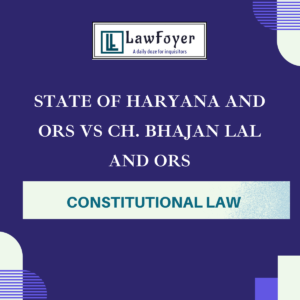SHREEJAL TRIPATHI (Amity University, Lucknow)
ABSTRACT / HEADNOTE
Former chief minister of Orissa was the appellant in this case. Many charges of corruption were put against her and in the course of inquiry she was called upon to attend at a police station to answer certain written questions. The appellant declined to answer questions asked and claimed the protection of article 20(3).Under section 179 of IPC she was prosecuted , for refusing to answer questions put forward by the lawful authority (the Deputy Superintendent of Police, Vigilance Cuttack).On this ground the accused challenged the rationality of the power of the judicial magistrate by moving to High Court under article 226 of the Indian Constitution and section 401 of Criminal Procedure Code. But the High Court failed to answer the limit of the section 161(2) of the criminal procedure code when an accused imposed article 20(3) during police interrogation because of which the plea of the appellant was rejected. And on receiving a certificate she appealed under article 132(1) in the Supreme Court. The Supreme Court held that for invoking Article 20(3) the party pleading must be accused of an offence, and that she compelled to answer the incriminating questions asked from her, and that calling a woman as a witness to a police station violates section 160(1) and might influence her testimony and that section 161(2) and Article 20(3) immunes the witness from being forced to answer incriminatory questions at the investigation stage itself.
- CASE DETAILS
| Judgement Cause Title | Petitioner: Nandini Satpathy Respondent: Dani(P.L.) and Anr |
| Case Number | SCC(2) 424 |
| Judgement Date | 07/04/1978 |
| Court | Supreme Court |
| Quorum | Justice V.R. Krishnaiyer Justice Jaswant Singh Justice V.D. Tulzapurkar |
| Author | V.R. Krishnaiyer |
| Citation | 1978 AIR 1025, 1978 SCC (2) 424,1978 SCR (3) 608 |
| Legal Provisions Involved | Article 20(3) of Indian Constitution, Section 161(1) of Criminal Procedure Code, Article 20(1) of Indian Constitution |
INTRODUCTION AND BACKGROUND OF JUDGEMENT
Article 20(3) of the Constitution guarantees-Right against Self-Incrimination to a person accused of an certain offence. While under Section 161(1) of Criminal Procedure Code, every person whosoever is questioned by the police is required to answer truthfully, sub-clause (2) of the same section provides the right against self-incrimination to the person who is being questioned. In this case, the legality of initiating proceedings under section 179 of IPC which lists down punishment incase someone fails to truthfully answer a question asked by a public officer was been questioned.
FACTS OF THE CASE
The Deputy Superintendent of Police(Vigilance, Cuttack) filed a complaint against the appellant under Section 179, IPC before the Sub Divisional Magistrate, Cuttack, for not answering the questions that were asked from her regarding an accusation of acquiring wealth out of proportion to her legitimate sources of income hinting towards a wrongful source of gain. The Magistrate issued summons to the accused to appear before the court, aggrieved by which the appellant moved to the High Court under Article 226 of the constitution and Section 401 of Criminal Procedure Code where her plea was rejected. So, she appealed to the Supreme Court under Article 132(1).
LEGAL ISSUES RAISED
The principal issue to be determined in the present case was the ambit of Article 20 (3) of the Constitution and, that of Section 161 (2) of Criminal Procedure Code.
PETITIONER/ APPELLANT’S ARGUMENTS
- The counsels for Petitioner / Appellant submitted that :
The Appellant argued that Section 161 Criminal Procedure Code doesn’t apply to an accused person, the questions that formed the chain of circumstance in the prosecution case are inclined to establish the accusation against the accused and thus Article 20 (3) might cover all such questions for being accusative.
RESPONDENT’S ARGUMENTS
- The counsels for Respondent submitted that:
The Respondent argued that Article 20 (3) didn’t apply at the stage of investigation .
RELATED LEGAL PROVISIONS
Article 20(3) of the Constitution, Section 179 of IPC and Section 161(1) and 161 (2) of the Criminal Procedure Code.
JUDGEMENT
The Court held that for invoking Article 20 (3), the party pleading must be accused of an offence, and that he/she was subjected to a compulsion to answer the incriminating questions asked from them, and that calling a woman as a witness in the police station violates Section 160 (1) and influences her testimony, and that Section 161 (2) and Article 20 (3) immune the witness from being forced to answer incriminatory questions at the investigation stage. Even the Miranda guidelines extended this immunity to the stage of investigation. The Appellant was thus directed to answer all relevant questions which are not self-incriminatory. The Prosecution case was thus dismissed.
RATIO DECIDENDI
The Ratio Decidendi, or the legal principle established in this case, is that the power of arrest should be exercised reasonably and not arbitrarily. The court emphasized that the power to arrest should be used only when it is absolutely necessary and not as a tool for coercion or harassment. It upheld the fundamental rights of individuals and emphasized the importance of respecting their liberty and dignity.
OBITER DICTA
Some of the notable obiter dicta included:
- Importance of Right to Privacy: The court discussed the importance of right to privacy and emphasized that individuals have the right to refuse to cooperate with the police without having the fear of arbitrary arrest or harassment. This observation highlighted the fundamental rights guaranteed to us by the Indian Constitution.
- Role of Police in Criminal Investigations: The court commented on the role of the police in criminal investigations, stating that while they have the authority to investigate crimes, they must exercise their powers judiciously and must also respect the rights of individuals. The court cautioned against misuse of power by law enforcement agencies.
- Judicial Oversight: The court suggested the need for judicial oversight to prevent abuse of power by the police. It emphasized the importance of courts in ensuring that arrests are made in accordance with the law and that the rights of individuals are protected.
- Balancing Individual Rights and State Interests: The court discussed the delicate balance between individual rights and state interests in maintaining law and order. It recognized the need for effective law enforcement while also stressing the importance of safeguarding individual liberties.
CONCLUSION& COMMENTS
This landmark judgment has well established the rights of an accused concerning the questioning in any case and limits the power of the investigating authorities to prevent exploitation of the accused, mentally or physically. The said case has provided strict guidelines against any third-degree torture by the officials to obtain any statements and any sort of duress to extract self-incriminating evidence by the accused. It has also petrified the provision under Section 160 (1) of Criminal Procedure Code to ensure the safety of women witnesses by exempting them from being called upon at any such place other than their house.
REFERENCES
Important Cases Referred
- In the case of Nandini Satpathy vs PL Dani, several legal principles and precedents were referred to by the Supreme Court of India in its judgment. Some of the key cases cited include:
- State of Punjab v. Baldev Singh
- H.N. Rishbud & Inder Singh v. State of Delhi
- State of Maharashtra v. Natwarlal Damodardas Soni
- Hussainara Khatoon v. State of Bihar
Important Statutes Referred
In the case of Nandini Satpathy vs PL Dani, several statutes were referenced by the Supreme Court of India.
i. The Code of Criminal Procedure
ii. The Constitution of India


